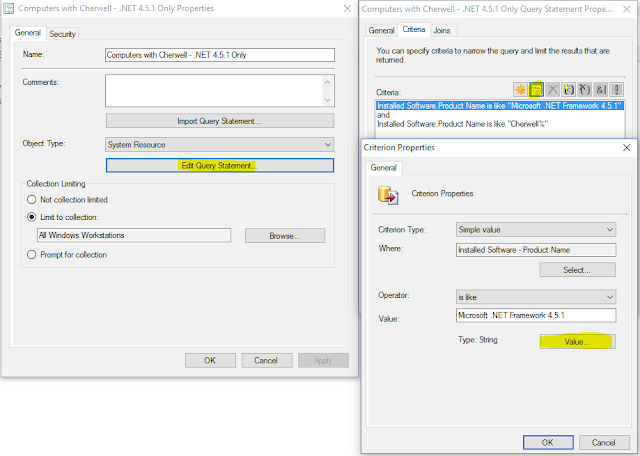Wednesday, April 5, 2017
Tuesday, March 7, 2017
RDS 2012 R2 - Server Manager Won't Show RDS Deployment
Scenario
Ok so you know that you installed your RDS roles and your server manager used to show you your RDS deployment. But today you logged in and you get the above message: "A Remote Desktop Services deployment does not exist in the server pool. To create a deployment, run the Add Roles and Features Wizard and select the Remote Desktop Services installation option".When this happened to me, I verified that the RDS roles were in installed - they were. My remote apps still worked, the roles were still there, etc. But server manager would not recognize the deployment.
Monday, February 13, 2017
PowerShell - Create Users, Databases, and Set Permission on MySQL
SCENARIO
You want to automate the creation of lots of MySQL user accounts, databases, and permissions set on those user accounts. You can do this through PowerShell.I modified a script by berniecamus: https://github.com/berniecamus/create-mysql-database/blob/master/createmysql.ps1
Create a csv file with the following headings:
Monday, September 19, 2016
WSUS Server 2012 R2: Computers won't show up in console
SCENARIO
You used to use Server 2008 or Server 2008 R2 for your WSUS server. You are upgrading to Server 2012 R2, but when you point your clients to the new server, they don't show up in the Update Services Console.Thursday, August 11, 2016
Powershell - Create List of Installed Software
Scenario
You want to find out what software is installed on the computers in your organization. You can use PowerShell to do this.First open PowerShell ISE and paste the following code in the script portion.
$list = Import-Csv "C:\TEMP\computers.csv"
foreach ($entry in $list)
{
try
{
$machinename = $entry.pcname
$SrvPath = "\\server\share"
$Date = Get-Date -UFormat %m-%d-%y
$FileName = "$machinename" + "_" + "$Date" + ".csv"
Get-WmiObject Win32_Product -ComputerName $machinename | Select-Object PSComputerName,Name,Vendor,Version | Export-Csv C:\$FileName -NoTypeInformation
}
catch [Exception]
{
}
}
foreach ($entry in $list)
{
try
{
$machinename = $entry.pcname
$SrvPath = "\\server\share"
$Date = Get-Date -UFormat %m-%d-%y
$FileName = "$machinename" + "_" + "$Date" + ".csv"
Get-WmiObject Win32_Product -ComputerName $machinename | Select-Object PSComputerName,Name,Vendor,Version | Export-Csv C:\$FileName -NoTypeInformation
}
catch [Exception]
{
}
}
Friday, June 3, 2016
Outlook Troubleshooting - Enable Logging
Scenario
There may be times when you are troubleshooting Outlook issues, but you would like to have more information about what Outlook is doing in the background. This is often the case when something happens in Outlook that isn’t right, but there aren’t any popup error messages.Monday, May 23, 2016
Add GImagex to Your WinPE Environment
Scenario
You have a WinPE boot drive with imagex on it, but you want to add GImageX to your WinPE environment so that you have a GUI front end for your WinPE boot drive. Mostly likely because you are tired of entering the imagex commands manually.If you want to know how to create the WinPE USB drive, please view this article.
Create Basic WinPE USB Drive - Windows 10
Scenario
You want to create a basic (no frills) bootable drive with WinPE on it. In this case we will be using the Windows 10 ADK tools.What you will need:
- Windows 10 ADK - https://msdn.microsoft.com/en-us/windows/hardware/dn913721.aspx
- USB Drive
- DISM GUI (Optional) - https://dismgui.codeplex.com/
Wednesday, May 18, 2016
Expand Values in SCCM Query Builder Values Box
Scenario
You are building or editing a query in SCCM 2012 R2. When you go to edit your query statement, you go to set your criterion properties and select a value.Friday, May 13, 2016
Step by Step Setup of MDT 2013 Update 2 Server
SCENARIO
You want a quick walk through on how to setup MDT 2013 Update 2 so that you can get started using it in your environment.
WHAT YOU WILL NEED
- A server OS - Server 2008 R2 or higher. We will be using Server 2012 R2 in this scenario.
- Windows Deployment Services role installed on our server.
- Download MDT 2013 Update 2. You can find it here.
- Download Windows ADK for Windows 10. You can find that here.
- Client OS (Win7, Win8, Win10) - whatever you plan on deploying.
- Drivers for the machines you are deploying to.
Driver Packs
Manufactures make driver packs for their various models. Use these!!!
HP WinPE Drivers - http://ftp.hp.com/pub/caps-softpaq/cmit/HP_WinPE_DriverPack.html
Lenovo Drivers - https://support.lenovo.com/cy/en/documents/ht074984
Subscribe to:
Posts (Atom)










